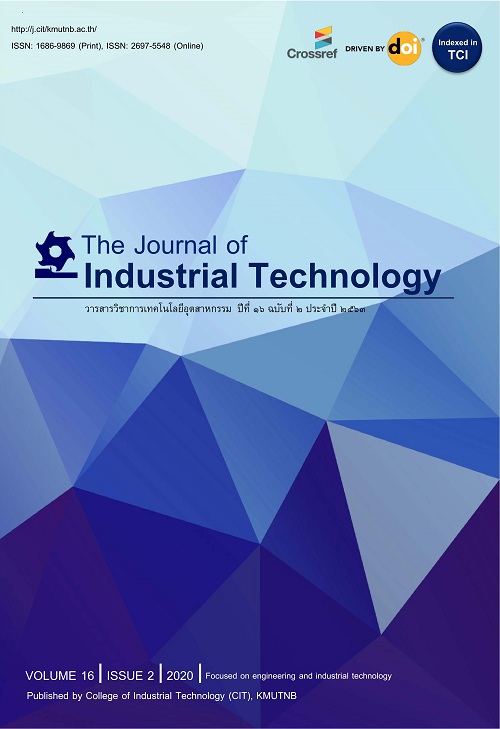บรรจุภัณฑ์อาหารต้านจุลินทรีย์จากพลาสติกย่อยสลายได้ทางชีวภาพ ผสมน้ำมันหอมระเหย
Antimicrobial Packaging from Biodegradable Plastics and Essential Oils Blends
Abstract
บทคัดย่อ
ในอดีต อันตรกิริยาระหว่างอาหารกับบรรจุภัณฑ์นั้นไม่ได้รับการยอมรับเนื่องจากมีความเชื่อว่าทำให้เกิดการเปลี่ยนแปลงคุณภาพของอาหาร แต่ในปัจจุบัน หลายงานวิจัยได้พิสูจน์แล้วว่าการเกิดอันตรกิริยาบางอย่างระหว่างอาหารและบรรจุภัณฑ์นั้นไม่ส่งผลเสียต่อคุณภาพของอาหาร อีกทั้งยังสามารถชะลอการเสื่อมเสียของอาหารได้ ดังนั้นเทคโนโลยีบรรจุภัณฑ์ต้านจุลินทรีย์จึงเป็นหนึ่งในแนวคิดที่เหนี่ยวนำให้เกิดอันตรกิริยาระหว่างอาหารและบรรจุภัณฑ์ในขณะที่รักษาคุณภาพทางโภชนาการ คุณสมบัติรวมทั้งความปลอดภัยของอาหารไว้ไม่เปลี่ยนไป โดยสารเติมแต่งที่นิยมใช้เพื่อเป็นสารต้านจุลินทรีย์เป็นสารกลุ่มน้ำมันหอมระเหยซึ่งได้จากการสกัดสารสำคัญทางธรรมชาติจากพืช โดยสารเหล่านี้สามารถออกฤทธิ์ในการยับยั้งการเจริญเติบโตของจุลินทรีย์ทั้งในกลุ่ม เชื้อรา ยีสต์และแบคทีเรีย ซึ่งทำให้อาหารเสื่อมเสียและสามารถก่อโรคได้ ส่วนพลาสติกชีวภาพนั้นเป็นวัสดุที่มีแนวโน้มจะนำมาใช้เพื่อทดแทนพลาสติกจากปิโตรเลียมในอนาคต ในเชิงพาณิชย์นั้นได้มีการนำเอาพลาสติกชีวภาพมาใช้เป็นบรรจุภัณฑ์อาหารเนื่องจากมีสมบัติทางกลที่ดีพร้อมทั้งยังสามารถย่อยสลายได้ทางชีวภาพอีกด้วย ทั้งนี้เพื่อเป็นการลดปริมาณขยะพลาสติกจากปิโตรเลียมพร้อมทั้งยืดอายุของอาหารที่บรรจุอยู่ในบรรจุภัณฑ์ นักวิจัยหลายกลุ่มจึงได้พัฒนาบรรจุภัณฑ์จากพลาสติกชีวภาพต้านจุลินทรีย์ขึ้นในช่วงทศวรรษที่ผ่านมา บทความนี้ได้กล่าวถึง ข้อมูลเบื้องต้นของพลาสติกชีวภาพ การเสื่อมเสียของอาหารเนื่องจากจุลินทรีย์ การเคลื่อนย้ายของสารต้านจุลินทรีย์จากบรรจุภัณฑ์สู่อาหารรวมไปถึงเทคโนโลยีการใช้สารต้านจุลินทรีย์ในบรรจุภัณฑ์พลาสติกชีวภาพกับอาหารประเภทต่างๆ
Abstract
The interaction between food and packaging was unacceptable in the past. It was believed to be altered the food quality. However, numerous literatures have proven that the specific interactions between food and packaging do not affect the quality of the food and it can also slow down the deterioration of food. Antimicrobial packaging technology is one of the concepts that induce interactions between food and packaging while maintaining the food properties, safety and nutritional quality. Generally, the additives used as an antimicrobial agent are essential oils, which extracted from plants. These essential oils are able to inhibit the growth of fungus, yeast, bacteria, food spoilage and pathogenic microorganisms. Bioplastics is expected to replace plastics from petroleum in the near future. Commercially, bioplastics were used for the food packaging applications due to their good mechanical properties and biodegradability. To reduce the plastic wastes together with the shelf life extension of food, many researchers have developed antimicrobial bioplastic packaging in the past decade. This article discusses the introduction to bioplastics, deterioration of food due to microorganisms, migration of antimicrobial agents from packaging to food as well as the antimicrobial packaging technology with various foods.
Keywords
Refbacks
- There are currently no refbacks.






